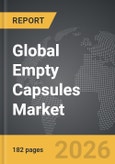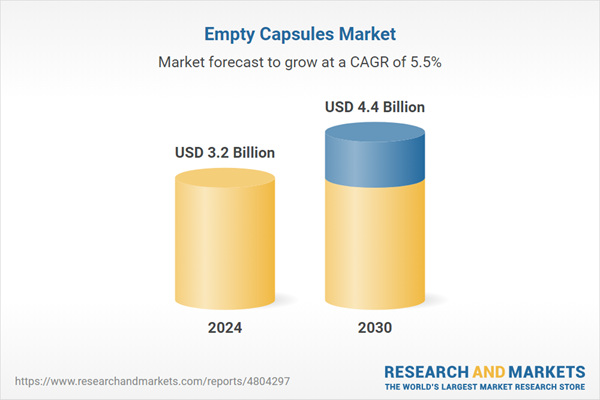Global Empty Capsules Market - Key Trends and Drivers Summarized
How Are Empty Capsules Revolutionizing Pharmaceutical and Nutraceutical Industries?
Empty capsules are revolutionizing the pharmaceutical and nutraceutical industries by providing a versatile, customizable, and efficient delivery method for a wide range of active ingredients. These capsules, which can be filled with powders, granules, liquids, or even semi-solids, are essential for the production of medications, dietary supplements, and herbal products. They offer an ideal solution for encapsulating compounds that may be sensitive to light, moisture, or air, ensuring the stability and effectiveness of the active ingredients. Empty capsules also provide significant advantages in terms of dosage accuracy, ease of use, and patient compliance, particularly for individuals who have difficulty swallowing tablets. The ability to customize the size, color, and composition of capsules allows manufacturers to create tailored products that meet specific therapeutic or dietary needs, enhancing both the effectiveness and appeal of the final product. As demand for personalized medicine and health supplements continues to grow, empty capsules are becoming increasingly important in the development and delivery of innovative health solutions.What Innovations Are Enhancing the Functionality of Empty Capsules?
Innovations in the production and design of empty capsules are enhancing their functionality through advancements in materials, manufacturing processes, and customization options. One of the most significant developments is the introduction of plant-based and vegetarian capsules made from materials such as hydroxypropyl methylcellulose (HPMC) and pullulan. These capsules offer a viable alternative to traditional gelatin capsules, which are derived from animal sources, making them suitable for vegetarians, vegans, and individuals with dietary restrictions. These plant-based capsules also provide better stability for encapsulating sensitive ingredients and are less prone to cross-linking, which can affect the release and absorption of the active compounds. Another key innovation is the use of advanced manufacturing techniques that allow for the production of capsules with enhanced features, such as enteric coatings that protect the contents from stomach acid and ensure targeted delivery in the intestines. Additionally, the development of flavored and scented capsules is improving the sensory experience for consumers, making it easier for individuals to take their medications or supplements. Customization options have also expanded, with manufacturers now offering a wide range of capsule sizes, colors, and printing capabilities, enabling the creation of distinctive, branded products that stand out in the market. These innovations are making empty capsules more adaptable, effective, and consumer-friendly, driving their adoption across a broad spectrum of health products.How Do Empty Capsules Impact Product Development and Consumer Compliance?
Empty capsules have a significant impact on product development and consumer compliance by providing a flexible and user-friendly dosage form that enhances the delivery and effectiveness of active ingredients. For product developers, capsules offer a convenient and efficient way to formulate and deliver a wide variety of compounds, including those that are difficult to compress into tablets or that require protection from environmental factors. The versatility of capsules allows manufacturers to experiment with different formulations, such as combining multiple ingredients or creating delayed-release products, without the need for complex manufacturing processes. This flexibility is particularly valuable in the nutraceutical industry, where the demand for innovative, multi-ingredient supplements is high. From the consumer's perspective, capsules are often preferred over tablets due to their ease of swallowing and lack of unpleasant taste or odor. This preference can lead to better adherence to prescribed regimens or supplement routines, improving the likelihood of achieving the desired health outcomes. Moreover, the ability to produce capsules in various sizes and with different release profiles allows healthcare providers to tailor treatments to individual needs, further enhancing compliance and effectiveness. By offering a dosage form that is both adaptable and consumer-friendly, empty capsules play a crucial role in the development of successful health products and in promoting better patient outcomes.What Trends Are Driving Growth in the Empty Capsules Market?
Several trends are driving growth in the empty capsules market, including the increasing demand for plant-based and clean-label products, the rise of personalized medicine, and the expansion of the nutraceutical sector. As consumers become more health-conscious and environmentally aware, there is a growing preference for plant-based capsules that align with vegan, vegetarian, and clean-label requirements. This shift is prompting capsule manufacturers to innovate with alternative materials that offer the same benefits as traditional gelatin capsules while meeting the needs of a broader consumer base. The rise of personalized medicine, where treatments are tailored to individual genetic profiles and health conditions, is also contributing to market growth. Empty capsules are ideal for creating customized medications and supplements, as they allow for precise dosing and the combination of multiple active ingredients in a single, easy-to-swallow form. Additionally, the expanding nutraceutical sector, driven by increased interest in preventive health and wellness, is fueling demand for capsules as a preferred delivery method for vitamins, minerals, herbal extracts, and other dietary supplements. The convenience, versatility, and consumer appeal of capsules make them a natural choice for nutraceutical companies looking to differentiate their products in a competitive market. These trends underscore the growing importance of empty capsules in the pharmaceutical and nutraceutical industries, as they continue to play a key role in meeting evolving consumer demands and supporting the development of innovative health products.Report Scope
The report analyzes the Empty Capsules market, presented in terms of market value (USD). The analysis covers the key segments and geographic regions outlined below.- Segments: Product (Gelatin, Non-Gelatin); Application (Antibiotics, Vitamins & Dietary Supplements, Antacid & Antiflatulent Preparations, Other Applications); End-Use (Pharmaceuticals, Nutraceutical, Other End-Uses).
- Geographic Regions/Countries: World; United States; Canada; Japan; China; Europe (France; Germany; Italy; United Kingdom; and Rest of Europe); Asia-Pacific; Rest of World.
Key Insights:
- Market Growth: Understand the significant growth trajectory of the Gelatin Capsules segment, which is expected to reach US$3.5 Billion by 2030 with a CAGR of 5.2%. The Non-Gelatin Capsules segment is also set to grow at 7% CAGR over the analysis period.
- Regional Analysis: Gain insights into the U.S. market, valued at $856.7 Million in 2024, and China, forecasted to grow at an impressive 5.3% CAGR to reach $695 Million by 2030. Discover growth trends in other key regions, including Japan, Canada, Germany, and the Asia-Pacific.
Why You Should Buy This Report:
- Detailed Market Analysis: Access a thorough analysis of the Global Empty Capsules Market, covering all major geographic regions and market segments.
- Competitive Insights: Get an overview of the competitive landscape, including the market presence of major players across different geographies.
- Future Trends and Drivers: Understand the key trends and drivers shaping the future of the Global Empty Capsules Market.
- Actionable Insights: Benefit from actionable insights that can help you identify new revenue opportunities and make strategic business decisions.
Key Questions Answered:
- How is the Global Empty Capsules Market expected to evolve by 2030?
- What are the main drivers and restraints affecting the market?
- Which market segments will grow the most over the forecast period?
- How will market shares for different regions and segments change by 2030?
- Who are the leading players in the market, and what are their prospects?
Report Features:
- Comprehensive Market Data: Independent analysis of annual sales and market forecasts in US$ Million from 2024 to 2030.
- In-Depth Regional Analysis: Detailed insights into key markets, including the U.S., China, Japan, Canada, Europe, Asia-Pacific, Latin America, Middle East, and Africa.
- Company Profiles: Coverage of players such as ACG, ACG Worldwide, Beeline Healthcare Ltd., Bio Caps India Ltd., Capscanada Corporation and more.
- Complimentary Updates: Receive free report updates for one year to keep you informed of the latest market developments.
Some of the 13 companies featured in this Empty Capsules market report include:
- ACG
- ACG Worldwide
- Beeline Healthcare Ltd.
- Bio Caps India Ltd.
- Capscanada Corporation
- Capsugel, Inc.
- Capsuline
- Comed Chemicals Limited
- D M Pharma
- Erawat Pharma Limited
This edition integrates the latest global trade and economic shifts into comprehensive market analysis. Key updates include:
- Tariff and Trade Impact: Insights into global tariff negotiations across 180+ countries, with analysis of supply chain turbulence, sourcing disruptions, and geographic realignment. Special focus on 2025 as a pivotal year for trade tensions, including updated perspectives on the Trump-era tariffs.
- Adjusted Forecasts and Analytics: Revised global and regional market forecasts through 2030, incorporating tariff effects, economic uncertainty, and structural changes in globalization. Includes historical analysis from 2015 to 2023.
- Strategic Market Dynamics: Evaluation of revised market prospects, regional outlooks, and key economic indicators such as population and urbanization trends.
- Innovation & Technology Trends: Latest developments in product and process innovation, emerging technologies, and key industry drivers shaping the competitive landscape.
- Competitive Intelligence: Updated global market share estimates for 2025, competitive positioning of major players (Strong/Active/Niche/Trivial), and refined focus on leading global brands and core players.
- Expert Insight & Commentary: Strategic analysis from economists, trade experts, and domain specialists to contextualize market shifts and identify emerging opportunities.
Table of Contents
Companies Mentioned (Partial List)
A selection of companies mentioned in this report includes, but is not limited to:
- ACG
- ACG Worldwide
- Beeline Healthcare Ltd.
- Bio Caps India Ltd.
- Capscanada Corporation
- Capsugel, Inc.
- Capsuline
- Comed Chemicals Limited
- D M Pharma
- Erawat Pharma Limited
Table Information
| Report Attribute | Details |
|---|---|
| No. of Pages | 182 |
| Published | January 2026 |
| Forecast Period | 2024 - 2030 |
| Estimated Market Value ( USD | $ 3.2 Billion |
| Forecasted Market Value ( USD | $ 4.4 Billion |
| Compound Annual Growth Rate | 5.5% |
| Regions Covered | Global |









